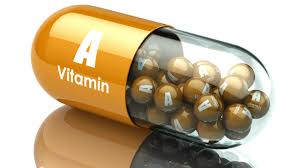Healthy, full-term babies get most of the vitamins and minerals they need from breast milk or formula. If you are breastfeeding, a well-balanced, varied diet will ensure that your baby gets all the nutrients he or she needs. When your baby starts eating solid foods, include a variety of fruits, vegetables, whole grains, and protein-rich foods.
1. Vitamin supplements for babies
From birth, all breastfed babies should be given a daily vitamin D supplement (8.5 to 10mcg). However, if your baby drinks more than 500ml of formula per day, then all infant vitamins do not need to be supplemented, as formula is fortified with vitamin D.
From six months of age and until your baby is 5 years old, choose a daily vitamin supplement such as vitamins A, C and D, unless your baby drinks 500ml or more of formula per day. When buying supplements containing vitamins for your baby, remember to read the label to check that they are age-appropriate.
From birth, all breastfed infants should receive a daily vitamin D supplement (8.5 to 10mcg)
2. Vitamins for Babies
2.1. Vitamin D
Vitamin D helps the body absorb and retain calcium and phosphorus, both of which are important for building strong bones. Vitamin D deficiency can lead to rickets, a disease that softens the bones and affects children in the United States usually in the first two years of life. Because breast milk does not provide enough vitamin D, all breastfed babies must be supplemented with this vitamin.
Vitamin D is found in some foods, but it is unlikely to be provided by fresh foods, such as oily fish and eggs.
The best source of vitamin D is the summer sun on our skin. But it is important to keep your baby’s skin safe from the sun. Do not expose your baby to the sun for too long in hot weather. Remember to cover or protect your baby’s skin before it turns red or burns.
Young children should still take vitamin drops, even if they are out in the sun. Children aged 1 to 4 years should be given a daily supplement containing 10μg of vitamin D.
2.2. Vitamin A
Among baby vitamins, vitamin A is very important for babies and young children. Vitamin A boosts a child’s immune system, helps their vision in dim light and keeps their skin healthy.
Good food sources of vitamin A include: fortified dairy products, carrots, sweet potatoes, dark green vegetables such as spinach, cabbage and broccoli.
Vitamin supplements containing vitamins A and C are recommended for babies and children aged 6 months to 5 years, unless they are consuming more than 500ml of formula per day.

Among vitamins for babies, vitamin A is very important for infants and young children.
2.3. Vitamin C
Vitamin C plays a very important role in the general health and immune system of children. Vitamin C helps the child’s body absorb iron effectively. Good food sources of vitamin C include: oranges, kiwi fruit, strawberries, cotton, broccoli, tomatoes, peppers…
2.4. Vitamin K
The American Academy of Pediatrics has recommended that all newborns receive a vitamin K injection right after birth to reduce the risk of bleeding. Because, vitamin K is needed by the body to help activate certain molecules that help blood clot.
2.5. Vitamin B12
Vitamin B12 keeps the body’s nerves and blood cells healthy, and helps create DNA, the genetic material in all cells. Vitamin B12 deficiency can cause a type of anemia called megaloblastic anemia that makes the patient tired and weak.
Vitamin B12 is not found in plant foods, so breastfeeding mothers who follow a strict vegan diet will need to supplement their diet with vitamin B12 to ensure that both they and their babies receive adequate levels of the vitamin.
Signs and symptoms of vitamin B12 deficiency in infants include: vomiting, lethargy, anemia, growth retardation, hypotonia, and developmental delay/regression. Breastfed infants may develop vitamin B12 deficiency at 2-6 months of age, but symptoms may not become apparent until 6-12 months. And breastfed infants may develop clinical signs of vitamin B12 deficiency before their mothers do.
In addition to the vitamins listed above, an important and indispensable mineral for infants is iron. Although breast milk is low in iron, most babies are born with enough iron stores to protect them from anemia, at least until they are 4-6 months old. If you have poorly controlled gestational diabetes or your baby is premature or born weighing less than 2500g, your baby may not get enough iron during pregnancy.
The AAP recommends that exclusively and partially breastfed infants receive 1 mg/kg/day of liquid iron supplementation starting at 4-6 months and continuing until solid foods containing iron are introduced at about six months of age. You should talk to your pediatrician about iron supplementation for your baby.
When you start introducing solid foods, choose foods that contain iron, such as fortified cereals, meat, fish, beans, soybeans, lentils, spinach, garbanzo beans, navy beans, Swiss chard, kidney beans, tofu, black beans, beef and eggs, and vegetables…
These are important baby vitamins that help support your baby’s development in the early stages of life and beyond. In case you are worried that your child’s diet is lacking in nutrients or your child is not cooperating, parents can take their child to Vinmec International General Hospital for examination, screening and effective advice, avoiding abuse that affects the child’s health. The examination process is always carried out by doctors and experts with many years of experience, so parents can be completely assured of the quality of medical care at Vinmec Hospital.
Vitamin deficiency can cause dangerous complications for the child’s health and spirit, so parents need to observe and promptly supplement these important vitamins.
In addition to dietary supplementation, parents can give their children nutritional supplements containing vitamins and essential micro-minerals such as zinc, lysine, chromium, selenium, vitamin B… to fully meet the nutritional needs of children. At the same time, these essential vitamins also aid digestion, enhance nutrient absorption, help improve anorexia, and help children eat well.





